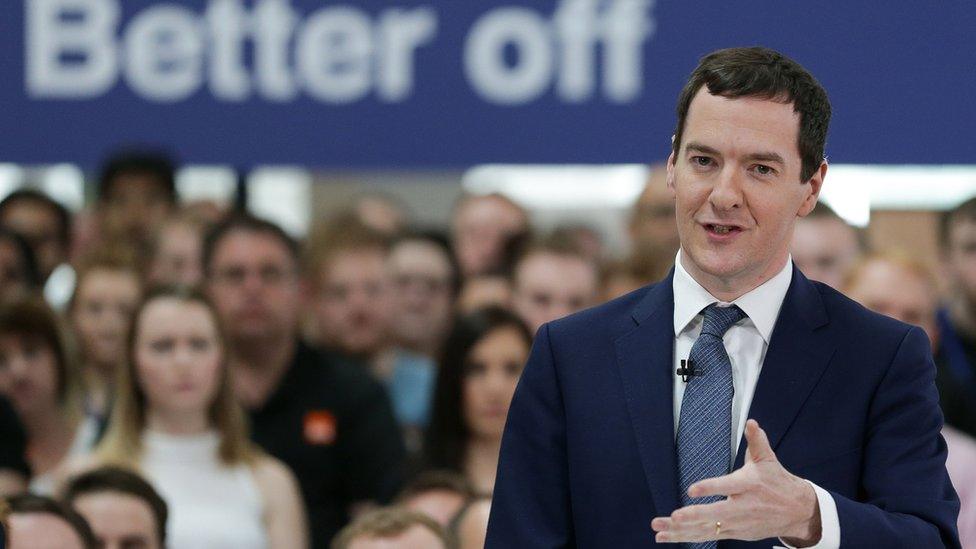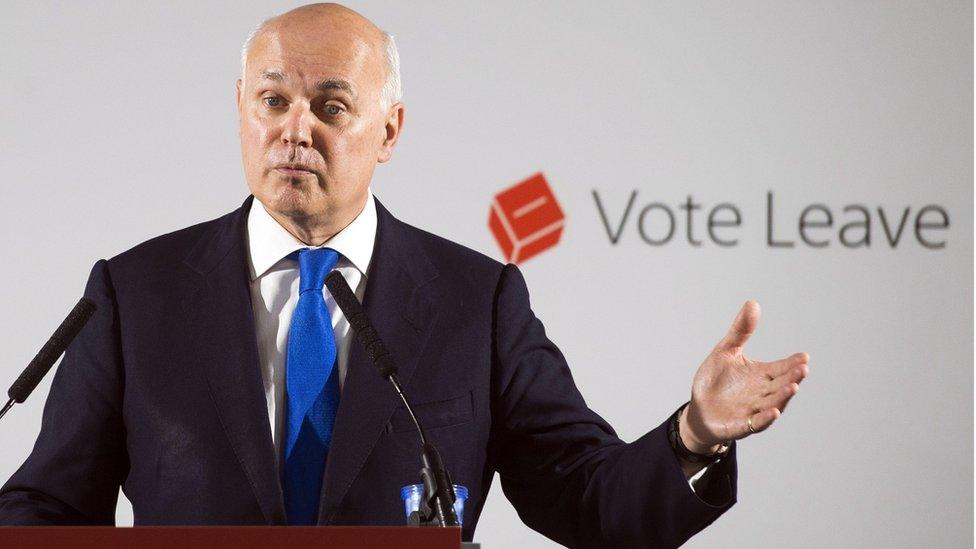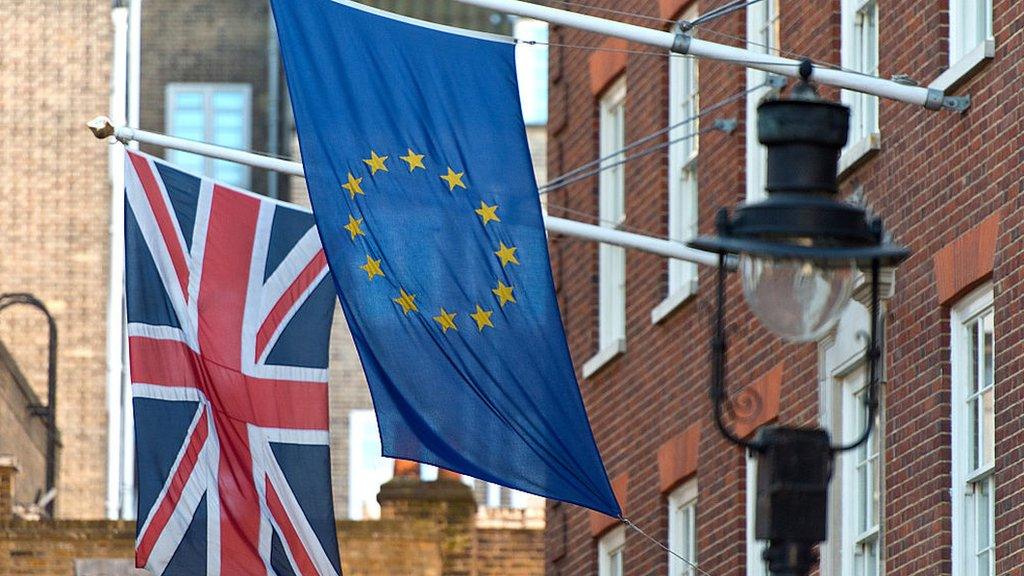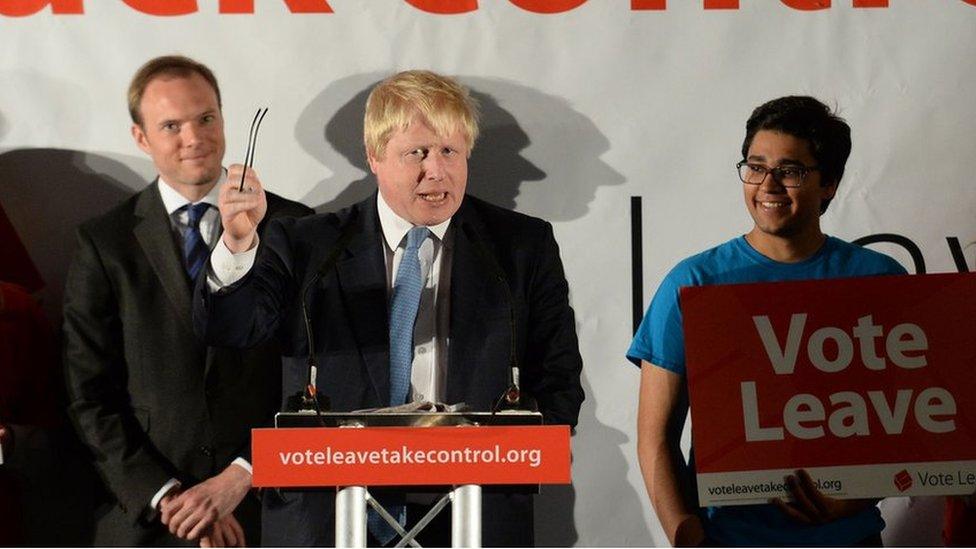Treasury warns of 'Brexit pension hit'
- Published

"It's important that pensioners understand what's at stake for them," George Osborne said.
The Treasury has warned that millions of current and future pensioners will be worse off if the UK leaves the European Union.
Its analysis suggests Brexit would cause inflation to rise, eroding the value of state pension increases, costing recipients £137 a year.
Those with an additional pension pot worth £60,000 would see its value drop by £1,900, the Treasury said.
However, Vote Leave said the analysis was "utterly outrageous".
Former Pensions Secretary Iain Duncan Smith, who is campaigning for Vote Leave, said: "This is an utterly outrageous attempt by the government to do down people's pensions and is little more than a cynical attempt to distract from the government's broken promises on immigration."
"The biggest threat to British pensions is the European Commission's proposals to undermine occupational pensions, which the government themselves have described as 'damaging and reckless'.
"Meanwhile, tax proposals from Eurozone countries will wipe billions off British assets hitting pension funds hardest," he said.

Former Pensions Secretary Iain Duncan Smith said the Treasury analysis was 'utterly outrageous'
'Security and certainty'
The Treasury analysis also looked at the impact Brexit would have on someone aged 50.
Its analysis found that an individual with pension savings of £20,000, who is contributing 8% of their earnings into a pension fund between now and 2030, would be between £223 and £335 a year worse off in retirement.
Chancellor George Osborne said: "Much of the [Brexit] debate so far has focused on the potential economic fallout of a vote for Leave for those now in work, in terms of the impact on their jobs.
"But it's important that pensioners understand what's at stake for them too on 23 June.
"Pensioners who have worked hard all their lives deserve dignity, security and certainty in retirement. That's what we all hope for and what any responsible government should seek to provide," the Chancellor said.
Pensions minister Baroness Altmann, told the BBC's Today programme, that there was a "consensus" among major economic bodies such as the Institute of Fiscal Studies, the OECD, the head of the IMF and the Bank of England that the British economy would be weaker if there was a vote to leave the EU.
"I have looked at pensions for years. If there is uncertainty, markets do not do well. If there is economic weakness companies cannot do well and that means your investments in pensions and the amount of money put in pensions will fall," she added.
'Apocalyptic picture'
Tom McPhail, head of retirement policy, Hargreaves Lansdown said such forecasting was "ambitious".
"The Treasury paints a fairly apocalyptic picture of widespread reductions in retirement incomes.
"The key assumptions they make are of higher inflation and lower economic growth; both of these assumptions may be open to challenge by the Leave campaign.
"Change the underlying assumptions and you change the outcomes."
The state pension has been subjected to a triple lock since 2010, ensuring it rises each year by whichever is higher - inflation, average earnings or a minimum of 2.5%.
He said at the moment state pensioners were receiving annual increases above the rate of inflation.
Higher prices would erode this benefit, but because state pension increases are pegged to inflation their standard of living would be maintained.
Mr McPhail said higher prices are likely to be more of a problem for some final salary pensions and many individual annuities that are not fully inflation-proofed.
"Higher inflation could therefore undermine the real value of these incomes.
"However we also note that a rise in bond yields following a Leave vote could equally have a significant beneficial impact on final salary scheme deficits."
He said a recent survey by fund managers conducted by Hargreaves Lansdown on the impact of Brexit, found the majority agreed it would mean lower GDP over 1 to 2 years, but more than a fifth suggested it could be higher in 5-10 years. In the longer term they forecast Brexit would have no impact on the economy.
- Published25 May 2016

- Published24 May 2016

- Published25 May 2016
